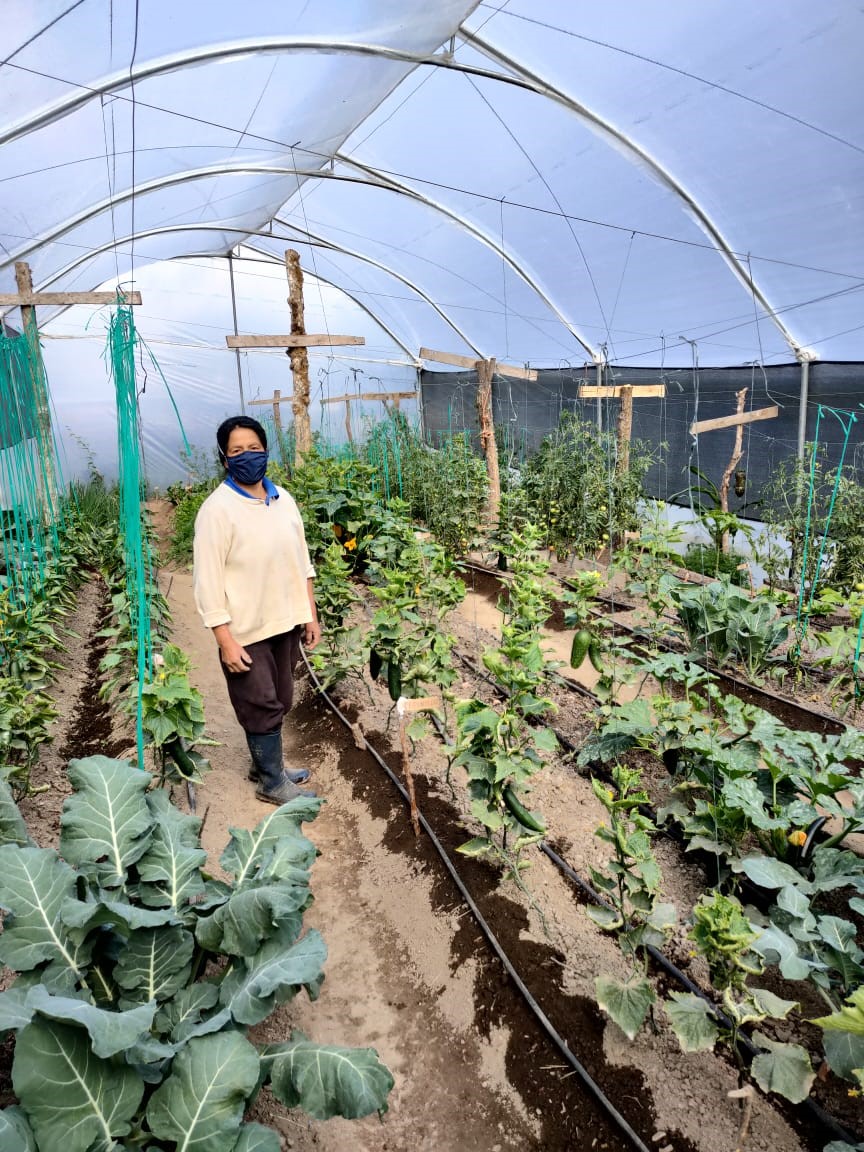Adaptation to the Impacts of Climate Change on Water Resources in the Andes (AICCA), Ecuador

Summary
This solution seeks to increase the resilience of the main productive sectors of the Napo Province, Ecuador, by promoting alternatives to intensive cattle ranching and agriculture, while at the same time reducing pressure on the paramo ecosystem and water resources. It is part of the project Adaptation to the Impacts of Climate Change on Water Resources in the Andes (AICCA).
The project Adaptation to the Impacts of Climate Change on Water Resources in the Andes (AICCA) in Ecuador, is implementing climate change adaptation measures to increase the resilience of the main productive sectors of the Cuyuja and Papallacta parishes in Napo Province. These parishes are located within the Cayambe Coca National Park, an important protected area in the country that is currently under strong pressure due to the advance of the agricultural frontier of the populations settled there. According to climate risk and vulnerability studies carried out by the project and climate change projections, this area is also facing an increase in heavy rains and frosts (hydrometeorological threats).
In this scenario, 42 indoor crops were grown in greenhouses with a metal structure and a drip irrigation system to maintain stable climatic conditions inside the greenhouse and protect the crops from heavy rains and frosts, which are frequent in the area.The solution is also implemented in the Checa and Chiquintad parishes (province of Azuay) of the Machángara river sub-basin (10 greenhouses with irrigation and 2 hydroponic systems), in response to the “hydrological drought” threat identified in the territory.
The AICCA Project is being implemented in Ecuador, Colombia, Peru and Bolivia in the sectors of hydropower, agriculture, minor irrigation and rainwater drainage, respectively.
Overview
- Implementation sites:
- Multiple countries
- Multiple locations
- Mountain region:
- The Andes
- Province:
- Foothills between the highlands and the Amazon region - Napo Province.
- Site locations:
Canton Quijos, parishes of Cuyuja and Papallacta.
- Solution scale:
- Ecosystem type(s):
- Solution type(s):
- Sector(s):
- Climate impact(s) addressed:
- Impact time-scales:
- Co-benefits:
- Implementation timeline:
- 2020 - 2022
Solution details
Main beneficiaries & outcomes
This action seeks to reduce the social and economic needs of the 42 beneficiary families in the Cuyuja and Papallacta parishes. The solution provides an alternative to intensive cattle ranching and agriculture, while at the same time reducing pressure on the paramo ecosystem and conserving areas of water importance.
The main benefit is the reduction of crop losses due to increased heavy rains and frost, thus promoting climate resilient livelihoods and reducing pressure on the protected area of Cayambe Coca National Park. Furthermore, the implementation of the adaptation measure called Greenhouses, also reduces people’s vulnerability to the risks of heavy rains and frost. This results in increased agricultural production, productivity and income diversification.
Planning and implementation
The AICCA Project is the lead organization in charge of planning and implementation. The project is led by the Ministry of Environment and Water and implemented by CONDESAN.
For the implementation of the initiative, the following process was followed:
- Working meetings were held with local stakeholders to identify the gaps and needs of beneficiaries.
- A climate risk and vulnerability study was carried out to identify climate hazards and the population’ s vulnerability. Climate hazards in the territory were defined, historical records were analyzed and perceptions were gathered from the population. Triangulation of criteria between historical records, climate models (risk studies) and the population’s perception. In the inter-institutional working group (GAD, Hidrovictoria, MAAE, MAG), the (possible) ways of adaptation to the previously identified climate hazards were proposed, as well as the level of increase in the adaptive capacity of the proposed actions and the level of acceptance of the stakeholders. Subsequently, the proposed actions were contrasted with the institutional competences for their execution, and project profiles were written to assess the social, economic and environmental feasibility of the initiatives, and documents were submitted to the roundtable for consideration and implementation.
- The intervention proposal was socialized with the villagers and criteria were defined for the work at the farm level (location in relation to climate risk, gender and vulnerable population groups, social vulnerability, associativity and replicability).
- Agreements were signed between the beneficiaries, the local government, and the project to promote the sustainability of the measure.
- The activity was implemented.
Stakeholders held working meetings to identify the problems and actions to be implemented by the project, pre and post implementation of the initiative.
Implementation of the initiative took place in 2020. The project leading the initiative will end in 2022. However, they are intended as long-term solutions, the agreements have been signed after project closure and ensure their prevalence and sustainability under the supervision of local stakeholders (working table).
Finance
The initiative was fully financed by the AICCA project through the GEF funding, at an approximate cost of $105,811.06 for the 42 greenhouses, corresponding to labor, designs, inspection and construction materials.
Innovation
The innovative aspect of this measure is that it avoids the expansion of the agricultural frontier, in addition to being an initiative that increases resilience. As next steps, it is intended to incorporate remote measurement instruments in order to have a real record of the climatic conditions inside greenhouses.
Performance evaluation
The resilient agriculture initiatives (greenhouses) have a monitoring system that evaluates the increase in adaptive capacity in the variables: type of income, diversification of livelihoods and increase in family income. The defined evaluation period is 2 years and with this, it would be possible to know if the measure is in the portfolio of incremental or transformational adaptation actions. The proposed system is a pilot and continues to be improved.
Long term project sustainability and maintenance
For the implementation of the initiative, tripartite agreements were signed between the beneficiaries, local governments and the AICCA project, in which they established maintenance actions. When the AICCA project ends its implementation period, these actions will be under the responsibility of the local governments, which will promote their sustainability through local markets.
Capacities for design and implementation
Knowledge
For the design and implementation of the greenhouses, the extreme climatic hazard analysis study, obtained through the perception of the beneficiaries and verified by the climatic records of the weather stations of the Napo region, was considered. Moreover, the knowledge of the population allowed us to visualize the ideal conditions for the location of the greenhouses. In addition to this initiative, training in good agricultural, livestock and environmental practices is being provided to strengthen their capacities.
Technology
In the implementation of the measure, geographic information systems have been used to consult, analyze and efficiently represent the spatialization of geographic information in reference to the territory.
Political / Legal
The AICCA project, being a project executed by the Ministry of Environment and Water, has allowed the implementation of the measure without any setbacks, supporting the activities implemented by the local government, whose function is to support and promote local production and commerce. The motivation and support of local and national authorities played a crucial role in implementing this initiative.
Institutional
Collaboration between the project and local partners was key to implementing this measure. The signing of agreements between the AICCA project and public and private institutions allowed the implementation of the adaptation measure in the territory. This type of instrument is fundamental for working together and measuring sustainability.
Socio-cultural
A stakeholder analysis was conducted at the beginning of the project. The work carried out in the territory by the AICCA project included the participation of local stakeholders and communities, who were involved in the co-development and implementation of the solution.
Outlook & Scalability
Barriers and adverse effects
There have been no setbacks or problems in the implementation and operation of the greenhouses. To ensure the proper functioning and use of the measure, the AICCA project, together with local partners, monitors its performance on a monthly basis.
Transformation and future outlook
The covered crops implemented by the AICCA project have increased productivity and crop diversification, in addition to the strengthening of agricultural and environmental capacities and knowledge for reducing vulnerability to the effects of climate change. This initiative has made it possible to reach conservation agreements with the beneficiaries in order to avoid expanding the agricultural frontier and achieve the sustainable development of their economic activities.
Potential for upscaling and replication
The implementation of greenhouses is a valuable alternative to strengthen the agricultural production system, in addition to guaranteeing a year-round food supply. For this initiative to work, it must be accompanied by a socio-environmental analysis. To be successful, the initiative must be accompanied by training in good production and environmental practices in order to ensure that present and future environmental impacts are minimized. The activity has the potential to be scaled up and replicated. The same steps should be followed in other areas where replication is desired and the corresponding funds should be allocated.
Finally
Acknowledgments
We thank the Autonomous Decentralized Governments of Cuyuja and Papallacta for the joint work, participation and support that has been carried out together with the AICCA project and the Ministry of Environment and Water.
CCA in mountains
Before defining adaptation measures, it is important to carry out a climate risk and vulnerability study to determine the impact that climate hazards may have on the study area. These studies should always be complemented with the perceptions of the population and local partners; it is also necessary to involve local stakeholders to promote conservation and sustainability agreements.
Contacts of key institutional partners involved with the solution planning and implementation
Ing. Diego Quishpe Landeta ([email protected])
Ing. Francisco Clavijo ([email protected])



(0) Comments
There is no content